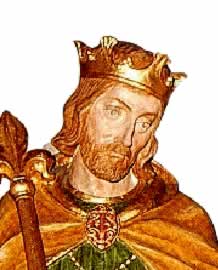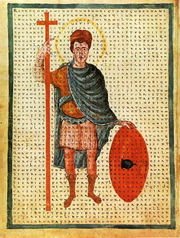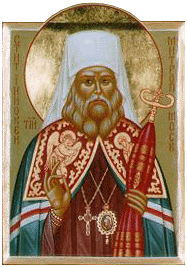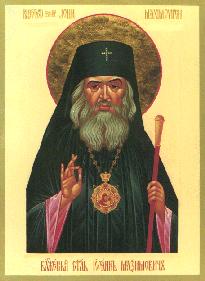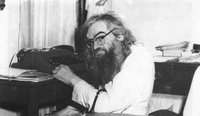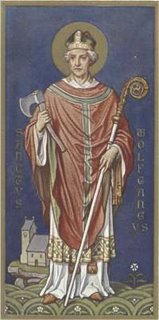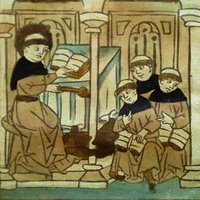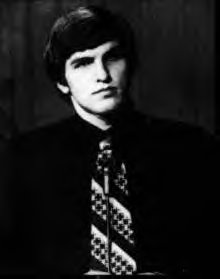by Father John H. Erickson, Dean of St. Vladimir's SeminaryAn Address given at the SVS Summer Institute – June 2004No apology is needed for the theme of this year's Institute: "Does
Christian Marriage Have a Future?" Practically daily we hear in the
media how "traditional" concepts and definitions of marriage are
being challenged. In the first few months of 2004 the focus has been
on same-sex marriage – now legal in Massachusetts, among other
places, and gaining vocal support in many quarters, Christian
churches included. But the challenge to "traditional" concepts and
definitions of marriage is not limited to this latest headline
getter. A few decades ago the term "open marriage" entered our
vocabulary. We also learned about "prenups," i.e., marriage qualified
in various ways by formal prenuptial agreements. These days we barely
blink when we hear about couples living together or when we encounter
marital breakdown ending divorce – divorce often followed by
remarriage and (then even more frequently) by another divorce. (A
frightening statistic: At this point the average length of a marriage
in the United States is five years.) If TV ratings and star salaries
offer any indication, we as a society see nothing amiss in sex and
marriage as these are presented on Friends, where sex has become a
recreational activity and marriage a running joke.
How are we Orthodox Christians to respond? It's easy to speak of the
need to maintain or restore "traditional" values of marriage and
family. All around us we find people doing so – including not a few
televangelists and politicians. It's easy simply to jump on the
bandwagon, to repeat what so many other folks are saying. It's harder
– but much more necessary – to examine more closely our own
understanding of Christian marriage. Do we have a distinctive and
compelling vision to offer today's society, rather than just
denunciations? What challenge can we pose to the world of Friends?
I believe that we do have a compelling vision to offer. But I also
believe that this vision will be at odds not only with the world of
Friends but also with some of the "traditional" understandings of
marriage that we encounter in our society and that we also may repeat
without appropriate critical reflection.
I'd like to begin with some aspects of the historical record – and
not just because I am a historian. It is important to examine our
preconceptions, what we take for granted, what we in turn often
believe to be common to human beings of every culture, of every
historical epoch, and therefore normal and normative for all human
beings. We often lapse into thinking that the past was very much like
the present, though maybe a little less spoiled. We look back with
nostalgia to the "good old days" – of the Eisenhower administration.
We look back at the way that marriage and family were understood and
practiced when Ozzie and Harriet and Leave It to Beaver were our TV
favorites. That's where we find our "traditional" family values and
the "traditional" understanding of marriage. It is important,
methodologically, to question this short-sighted understanding of
what is "traditional." Before we as Orthodox Christians can recover
our own distinctive vision and voice, before we can present that
vision as a credible challenge to the world of Friends, we have to be
aware of how different the past was. In particular, we have to be
aware of the enormous differences between pre-modern traditional
societies and modern society as it emerged especially in the last
century. The realities that impinge on people today who marry or
don't marry, who have children or don't have children, are not
necessarily the same as those of a thousand or two thousand years ago
or even a hundred years ago. A couple factors may easily be overlooked.
First of all, the place of marriage in life and society itself is
different. We today have a lot of choices thrust upon us - e.g., to
marry or not to marry. In most pre-modern societies, there were far
fewer options, far fewer choices when it came to life and lifestyle.
In the relative absence of social and even physical mobility, a great
deal more was taken for granted. Your life would be very much like
that of your parents. If your father was a farmer, you would be a
farmer – or farmer's wife. Barring some calamity, you would remain in
the same village; you would remain in the same social class. You
would marry, and marry relatively young, especially in the case of
women; and within marriage you would have very clearly delineated
roles, prescribed by custom and tradition right down to acceptable
positions for sex. You would have children if you could, because you
needed them for economic reasons, to help in the fields or in your
trade. And in the absence of a civil society offering some measure of
protection to individuals, your very survival depended on having a
close network of family and clan, an extended family often domiciled
together, people who could help you in times of adversity or take
revenge on someone who had wronged you.
Certainly in the Roman world, where Christianity first spread,
"family values" were very important. Roman law offered many powerful
incentives to marry and have a family, and it imposed penalties for
not doing so. But this was mainly for utilitarian reasons, to
maintain social structures and assure the economic wellbeing of the
empire. Men and women were expected to place their bodies at the
service of society, as it were, men by governing a household – and
here keep in mind that this was very definitely a patriarchal,
androcentric society - and women by bearing children. So too in
ancient Judaism, "family values" were important. Men had to have
children as a means for survival in life - and beyond. Offspring
provided your only immortality. Hence the levirate, which provided
that if a man died without issue, his brother should take his wife
and raise up children for him. In general, then, whether in Roman
society or ancient Judaism, you could not expect to find divine favor
or human respect if you didn't marry and have children. No place for
singles here, or for the barren! Those who were unmarried generally
were subordinate elements within the extended household – slaves,
unmarriageable daughters, widowed grandmothers, and others who helped
provide necessary services for the household, from child-care to
elder-care.
One more thing to note: In the Graeco-Roman world, as in many other
traditional societies, you did not look to marriage and family to
fulfill all your needs in life - at least if you were a free man.
Marriage was important for your economic wellbeing and material
support – certainly you valued your wife and children just as you did
your other possessions. But for emotional support you looked to
friendship, which by definition was possible only with peers, with
other respected male members of society, and certainly not with women
or slaves or other inferiors. And often you did not look to marriage
even for major sexual satisfaction. A very revealing ancient saying
goes something like this: The gods have given us our wives for
legitimate children, men for friendship, and courtesans for pleasure.
Could someone – for whatever reason - opt out of the social demands
of marriage and family? This would have been very difficult in
antiquity, whether Jewish or Greco-Roman, and indeed in most pre-
modern societies. But Christianity offered the ancient world a very
different message, a very different view of marriage and family – one
that was truly revolutionary and truly liberating. Christianity told
men and women that you do not have to marry and procreate to be saved
- to have a sense of self-worth accompanied by a sense of divine
acceptance and acceptance by those other human beings who mean the
most to you. Christianity accepted and honored marriage, but it also
accepted and honored celibacy. It valued children, but it also saw
the barren – Joachim and Anna, Zacharias and Elizabeth – as blessed
by God. In short, Christianity relativized the importance of both
marriage and family. It did so by placing marriage and family - and
indeed all human relations - in a new perspective, a perspective made
possible by Christ's self-giving love. The ancient world valued
marriage and family very highly, but for the wrong reasons. It valued
them because they were thought to be a hedge against death – one's
own death, the death of society. But Christ showed that love is
stronger than death.
We will be returning to the new perspective offered by Christianity
at many points during the coming days. For the moment, however, I
would like to return to the subject I raised earlier: the difference
between the world of antiquity, the traditional world of pre-modern
society that we have just surveyed, and the modern world, the world
in which "traditional" notions of marriage and family are being
challenged in so many ways.
Certainly in the modern world, we have greater economic and social
mobility. No longer is it taken for granted that your life will
differ little if any from that of your parents. Quite the opposite!
Here in America we like to believe that the son or daughter of a poor
immigrant coal-miner can become a doctor, a lawyer, a successful
businessman. We also emphasize the dignity and the rights of the
individual, giving less importance to the group, the clan, the wider
society. And we place enormous importance on personal fulfillment,
making this the goal of life. We are encouraged to discover what is
really important to me, what really makes me happy, what really
satisfies me. And given modern affluence, we can usually figure out
some way to finance our self-gratification.
In this modern world, there is no longer a self-evident relationship
between marriage and maintenance of subsistent daily life or even
mundane happiness and satisfaction. In economically developed
countries, marriage is no longer an economic and practical necessity.
You don't have to marry and stay together (even though you may really
hate each other) and have children in order to scratch a living from
a meager plot of land. You don't have to be married to enjoy a
comfortable life. You can find many avenues for fulfilling, enriching
personal experience in careers outside the home. In this modern
world, to marry or not to marry, to have children or not to have
children, requires more self-conscious decisions than was the case in
traditional societies. But here is the irony. In this modern world,
very much as in traditional societies, marriage and family (now
reduced to the nuclear family) very often is held up as the norm for
the normal, well-adjusted human being. Certainly through the 1950s
and even beyond, it was generally expected that anyone worthy of
respect would get married, have kids, buy a nice suburban house,
acquire a car and a dog, join the PTA, and be an active church member
in the bargain. (Of course, not everyone fit this pattern, but these
were viewed with some suspicion and distrust.) Often, from our
present perspective, we look back on this as "traditional" marriage,
normal and normative - the way things always have been, the way they
should be now. But the element of necessity attendant on marriage in
past ages and other societies was absent: the goal had become
personal fulfillment, with marriage presented as the place where
personal fulfillment can be found. The ideal marriage, as presented
in popular literature from the 1920s-30s onward, comes to be
"companionate marriage": the bliss of husband and wife together, as
helpmeets, lovers, best friends, soul-mates. In contrast to earlier
times, marriage comes to be seen as the place where the normal, well-
adjusted human being, male or female, can expect to find virtually
every satisfaction - sexual, emotional, spiritual. This is asking a
lot of marriage!
Christians have bought into this understanding of marriage in a big
way. This has been especially true in evangelical Protestantism,
where marriage very often is presented as THE appropriate state for
the good Christian, as God's highest calling for all men and women.
But we Orthodox have done so also. Quite rightly, no doubt, we have
spoken about the goodness of God's creation of the human being as
male and female. Perhaps in reaction to an earlier and possibly
unhealthy preoccupation with celibate life, we have ransacked
patristic literature for remarks favorable to marriage and sexual
activity and have complained, on the other hand, about those many
patristic texts that do not seem quite so enthusiastic. In much of
our popular literature on marriage, an unmarried life - celibacy in
whatever expression, monasticism included - is not really presented
as an option. Here are a few remarks culled from student mini-essays
in the course that Prof. Rossi and I give on marriage: "For their
spiritual health, people need to be channeled into an accountable way
of life" – the context here suggesting that unmarried people are
shirking responsibility. "For the never married, the Church and
priests should work to help people find mates." The Church should
"give confidence to the unmarried and dispel fear of marriage through
sermons, talks, retreats and seminars." These remarks may not be
altogether representative. Some mini-essays over the years have noted
that "marriage is not for everyone" and that we should not regard the
single state as only an interim before marriage, something temporary,
an abnormality in need of correction. But the overwhelming tendency
is to present marriage as the norm for Christian life.
This of course places enormous pressure on the unmarried. Consider
the comments that one often hears: "I can't understand why an
attractive young girl like you has not found herself a husband." Or:
"How many children do you have? None, I'm not married. Oh, I'm
sorry..." But this also places a lot of pressure on the married. Very
few real life marriages reach the levels of bliss and personal
fulfillment that we have come to expect – yea, to demand – from
marriage. This can become a source of frustration. We think:
Something must be wrong with my marriage. It doesn't measure up.
Contrary to what society has promised, contrary even to what the
Church has promised, it's not making me happy right now, and maybe it
never will. We want our marriage and family to be as warm and fuzzy
as what we found while watching Ozzie and Harriet and Leave It to
Beaver. What we get is Married with Children.
We do a disservice to the world – to the world of Friends, to the
world in which we ourselves must work out our salvation – if we put
forward a glossy, idealized, unrealistic and unattainable picture of
marriage as the ultimate end of human life. If we really want to
challenge the world of Friends, we cannot simply rely on what those
around us may regard as "traditional marriage." We need to offer a
different perspective – the perspective that we find, first of all,
in the New Testament. There, as I suggested earlier, we find the
importance of both marriage and family relativized. Marriage was
good, but so was celibacy – and neither was an end in itself. Both
marriage and celibacy were ordered to a higher good. Both therefore
could be considered as being instrumental in nature – as leading to
this higher good, as means of bringing us closer to God, who is good
in Himself and the source of all goodness. The goodness of marriage –
or of celibacy – in a given case depended on how well it served a
higher purpose, the purpose of salvation.
We find this perspective set forth most clearly in the epistles of
St. Paul, and particularly in I Corinthians chapter 7, where marriage
is treated at length. Other presentations will examine this important
text more closely. Right now I would simply like to review some
points in it that are particularly important for our theme. The
chapter begins by considering whether it is better to marry or not to
marry. Here Paul gives counsel but no command. He wishes that all
were as he himself is, i.e., in a single state, but he recognizes
that "each has his own special gift from God, one of one kind and one
of another." Ultimately it doesn't matter if you are married or
unmarried, as long as you don't fall into immorality. The text goes
on to consider divorce and the special case of believers who are
married to unbelievers – sections that we have no time to discuss at
this point. Paul then comes to what I would regard as his "bottom
line": "Only, let every one lead the life which the Lord has assigned
to him, and in which God has called him." Are you Jew or Gentile,
circumcised or uncircumcised? It doesn't matter, "for neither
circumcision counts for anything nor uncircumcision, but keeping the
commandments of God." Paul then repeats: "Everyone should remain in
the state in which he was called." He continues immediately "Were you
a slave when called? Never mind. But if you can gain your freedom,
avail yourself of the opportunity. For he who was called in the Lord
as a slave is a freedman of the Lord. Likewise he who was free when
called is a slave of Christ." Note here how both slave and free are
encouraged to view their status from a new perspective. And then Paul
repeats yet again: "So, brethren, in whatever state each was called,
there let him remain with God."
Why is it so important to remain in the state in which you were
called, to lead the life which the Lord has assigned to you? Paul
isn't arguing for maintenance of the status quo. He certainly isn't
defending the abusive domination that characterized social patterns
in his day. Rather, he is urging his readers to view all their
relationships – marriage, family, ethnic background, social status -
in an eschatological perspective – that is, in light of the ultimate
destiny or purpose of mankind and the world. We see this in the
verses that immediately follow:
Now concerning the unmarried, I have no command of the Lord, but I
give my opinion as one who by the Lord's mercy is trustworthy. I
think that in view of the impending distress (i.e., the End Time that
is coming upon us), it is well for a person to remain as he is. Are
you bound to a wife? Do not seek to be free. Are you free from a
wife? Do not seek marriage. But if you marry, you do not sin, and if
a girl marries she does not sin. Yet those who marry will have
worldly troubles, and I would spare you that. I mean, brethren, the
appointed time has grown very short; from now on, let those who have
wives live as though they had none, and those who mourn as though
they were not mourning, and those who rejoice as though they were not
rejoicing, and those who buy as though they had no goods, and those
who deal with the world as though they had no dealing with it. For
the form of this world is passing away."
The form of this world – with all its empires and self-serving power
structures and abusive relationships – is passing away. What is
important in this penultimate chapter in human history, is – as Paul
says a few verses later – "your undivided devotion to the Lord." So
"lead the life which the Lord has assigned you" – as Jew or Greek,
slave or free, married or unmarried – but always keep your eyes on
the prize, look to the coming End. Orient your life - and all its
relationships - to this End. Live out your life in anticipation, hope
and expectation of an Ultimate beyond the institutions of the present
age, marriage included. Let all aspects of your life, all your
relationships, serve this End and lead to this End - the complete
fulfillment of God's plan for His creation.
This eschatological perspective was important for the Corinthian
Church to keep in mind. It also is important for us to keep in mind
today. We are called as we are - conflicted, weak and sinful human
beings, with an incredible range of gifts and an even more incredible
range of hang-ups. But we are called to a life of wholeness and
holiness. We are called to participate in God's holiness, to become
holy ones, even as God is THE Holy One. We are called to love in ways
beyond our own limited human capacities, to freely accept the self-
sacrificing love that God has revealed in Jesus Christ and to express
this love throughout our own lives, in whatever state the Lord has
assigned to us.
This eschatological perspective may also be helpful as we try to
address concrete issues related to marriage and family today.
First of all, marriage itself in real life is not a static
phenomenon, contrary to the idealized picture so often presented to
us (e.g. in those advertisements that promise great sex till you're
70). Ideally marriage involves growth. Inevitably it involves change;
it goes through stages, just as human beings themselves go through
stages in life. Certainly a major change comes with the birth of a
first child, when wife becomes Mommy and her attention is largely
diverted from her husband to the baby that he has fathered. Another
major change comes when Mommy and Daddy finally become empty-nesters,
their attention no longer on carpooling for the kids' soccer matches.
Will they rediscover each other in a new way at this new stage in
their married life? And for more and more married couples these days,
another change occurs when one or both eventually becomes
incapacitated, by Alzheimer's or Parkinson's, for example. What are
billed as the "golden years" can be very difficult indeed for even
the happiest married couple. The basic question at each of these
stages is whether they will be seen in instrumental terms, as
pointing to an End beyond this or that immediate situation, beyond
this or that relationship – whether each stage will be greeted as a
fresh opportunity for growth in holiness. Or will each new stage
become a source of frustration because right now this particular
relationship doesn't measure up to our idealized picture of what
married bliss should be. (Ironically this was often less an issue in
past times. Not only was life expectancy shorter. There was a sharper
delineation of the stages of life: infancy, childhood, youth,
adulthood, old age. After social obligations of adulthood had been
met, after children had been begotten and reared and sent off on
their own, husband and wife had reached old age, when they were free
to retire to a monastery or lead comparable life at home. They were
not expected to behave like newly-weds.)
Let's consider children and family life. What does an eschatological
perspective have to offer here? We often idolize our children, do
everything for our children. In fact this may simply reflect our own
egotism. Children are a great source of pride! We should keep in mind
that childbearing and nurture is not an end in itself. A fortiori, it
is not for our own gratification. We often worry excessively about
how our children will "turn out," to the point that this can become
our sole preoccupation. This shouldn't be the case. Raising children,
like other aspects of married life, should be viewed in instrumental
terms: It should point us to an End beyond how the children
themselves turn out. Don't put your children first. Put God first.
Your love of God, your trust in Him, your orientation of the whole of
life toward Him, will not diminish your love for your children.
Rather, this will purify your love for them, turning it from self-
gratification into an expression of Christ's own self-sacrificing love.
And children are not the only possible instrument in our pursuit of
holiness in marriage. St. John Chrysostom addresses the subject of
childlessness with great sensitivity. Within childless marriage,
other instruments of virtue can be cultivated: hospitality, service
to others, common creation. In any case, we must resist the
temptation to live simply for each other, without concern for growth
in holiness, without concern for God and for our fellow human beings.
What about alternatives to marriage? In the developed and developing
world generally, unmarried persons are a growing percentage of the
population. In the United States approximately 50% of adults are
unmarried. The profiles and concerns of these unmarried persons are,
of course, diverse. Some are deferring marriage until certain
personal goals - educational, professional, economic, emotional - are
met. Some will never marry. Some are divorced or separated - and not
always in anticipation of divorce - e.g., they may be separated
because of imprisonment. Some are widowed. The problems that
unmarried people face are also diverse. The problems of an elderly
widow or widower - health care, for example - will not be the same as
the problems of a younger divorced woman trying to get into - or back
into - the labor market while at the same time managing children and
other responsibilities. And these will not be the same as the
problems and concerns of a never-married person of whatever age. But
there are some common concerns. In surveys and interviews, loneliness
is often mentioned – the loneliness of the prepackaged meals for one
that now are so common in our supermarkets. And singles of whatever
profile and category often suffer other anxieties, many of them
culture-induced. There are a lot of pressures for "singles" to fit
into the expectations and values of a culture that continues to
idealize and idolize the family model of husband, wife, two kids,
three cars and a dog. (This may be one of the reasons behind the
current push for same-sex marriage. Gay and lesbian couples want to
"fit in.")
The unmarried are, as I said, a very diverse group. But often we take
"unmarried" as synonymous with the swinging single presented in so
much advertising. Certainly there are many people who might be
described as "pre-married" – people who expect to get married (or
remarried) someday, but who are now deferring marriage for a variety
of reasons: fear of commitment, waiting for the "right" person to
come along (a delusion, of course!), concern for a career, possibly
even a very noble career. We shouldn't assume that these people are
real-life versions of the cast of Friends. But single life in America
today is spiritually treacherous. With young and not so young
singles, we find a kind of protracted adolescence. They have to make
many more decisions than was the case in pre-modern societies –
decisions about education, career, employment, location, living
arrangements, life-style. In the past most people had no choice
whatsoever in such matters! But young people often lack a sense of
responsibility for their decisions, a sense of their ultimate
significance. Sex, for example, can easily become a recreational
activity, alongside dining out or going to the movies, altogether
unrelated to self-giving love. This makes it very difficult for young
people ever to settle down, in marriage or in any other state.
How can the Church minister to unmarried people? How in particular
can it minister to young singles? For much of Church's history, this
has not been an issue. Today it is. We no longer live in the
traditional societies of the past. We live in the world of Friends.
In certain respects the answer is simple. Whether ministering to
married people or unmarried people, the Church must present the
eschatological challenge that St. Paul posed to the Corinthians. "In
whatever state each was called, there let him remain with God…. For
the form of the world is passing away." In this perspective, each of
us is called to ascetical struggle, whatever our state in life may be
– struggle against self-gratification, for example, which can be as
much a temptation for the married as for the unmarried, struggle to
find ways to grow in God's love in all the diverse situations and
relationships in which we find ourselves. At any rate, we cannot
assume that being single is an impossible obstacle to growth in
wholeness and holiness any more than we can assume that being married
is a guarantee of wholeness and holiness.
All of us are weak and broken human beings, damaged in one way or
another by sin. This is the state in which we are called, to be saved
by God's grace. But we sense a need for healing and wholeness. The
message of the Church on this point is simple and direct: We will
find this healing and wholeness in God and only in God. This is not a
message that we hear very often. More often we are encouraged to
believe that we will find healing and wholeness in other ways – and,
high among these, by getting married. "The single state is
treacherous," we tell young people. But we then imply or even come
out at say: "Marriage will solve your problems." Is this true? Many
people believe it. Consider the following statement, typical of what
those who are involved in premarital counseling hear all too often:
"Yeah, I get jealous and lose my temper, and maybe I get a little
physical if I think she has been looking at other men, but when we
get married that won't be happening." Hearing something like this,
you know that this guy's violent behavior is not going to improve.
Likely it will get worse. Or consider this: "There are things that
bother me about Brad's behavior, but I know that when we get married
my love will change him." You know that isn't going to happen! We
have reached the final TV season of Friends. They've paired up,
married off. But you know that this isn't going to insure fidelity
and endless married bliss. Marriage is not going to cure everything
that‘s wrong with these people - or with any of us. Marriage may be
the context in which most of us will find healing and wholeness. But
marriage itself is not the source of healing and wholeness. Marriage,
just like the single state, can be spiritually treacherous –
particularly when it becomes a false god. As we consider the
challenges currently being posed to Christian marriage – challenges
that we hear about in the media practically every day – , let us keep
in mind that even "traditional" marriage can pose a challenge to our
Orthodox understanding of salvation – by offering a false sense of
security, by making false promises, by suggesting that marriage
itself, and not God, is what can give us wholeness in a broken world.
Some may find wholeness in marriage. Some may find wholeness in the
single state. But they will not find this unless they turn first to
the source of all healing, the source of wholeness, to the Holy One.
-------------------------------------------
Prof. Erickson is Professor of Church History at Saint Vladimir's Theological Seminary
Edited by Fr. Michael of St. Petroc's Monastery (ROCOR) in Tasmania.





